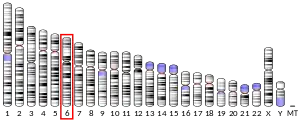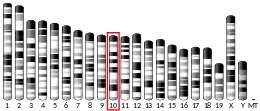Protein THEMIS
Protein THEMIS is a protein encoded by the eponymous THEMIS gene.[5][6][7]
| THEMIS | |||||||||||||||||||||||||||||||||||||||||||||||||||
|---|---|---|---|---|---|---|---|---|---|---|---|---|---|---|---|---|---|---|---|---|---|---|---|---|---|---|---|---|---|---|---|---|---|---|---|---|---|---|---|---|---|---|---|---|---|---|---|---|---|---|---|
| Identifiers | |||||||||||||||||||||||||||||||||||||||||||||||||||
| Aliases | THEMIS, C6orf190, C6orf207, GASP, SPOT, TSEPA, bA325O24.3, bA325O24.4, thymocyte selection associated | ||||||||||||||||||||||||||||||||||||||||||||||||||
| External IDs | OMIM: 613607 MGI: 2443552 HomoloGene: 72287 GeneCards: THEMIS | ||||||||||||||||||||||||||||||||||||||||||||||||||
| |||||||||||||||||||||||||||||||||||||||||||||||||||
| |||||||||||||||||||||||||||||||||||||||||||||||||||
| |||||||||||||||||||||||||||||||||||||||||||||||||||
| |||||||||||||||||||||||||||||||||||||||||||||||||||
| |||||||||||||||||||||||||||||||||||||||||||||||||||
| Wikidata | |||||||||||||||||||||||||||||||||||||||||||||||||||
| |||||||||||||||||||||||||||||||||||||||||||||||||||
Function
This protein plays a regulatory role in both positive and negative T cell selection during late thymocyte development. The protein functions through T-cell antigen receptor signaling, and is necessary for proper lineage commitment and maturation of T-cells.[8] Changes in THEMIS gene expression due to the rs138300818 variant promote the development of early-onset type 1 diabetes.[9]
The name
THEMIS is an acronym for thymocyte-expressed-molecule. Themis is also the name of a Titan in Greek mythology who weighed the fates of humans, an apt choice since the protein is important in deciding the fate of the T cell during development.[10]
References
- ENSG00000172673 GRCh38: Ensembl release 89: ENSG00000275122, ENSG00000172673 - Ensembl, May 2017
- GRCm38: Ensembl release 89: ENSMUSG00000049109 - Ensembl, May 2017
- "Human PubMed Reference:". National Center for Biotechnology Information, U.S. National Library of Medicine.
- "Mouse PubMed Reference:". National Center for Biotechnology Information, U.S. National Library of Medicine.
- Fu G, Vallée S, Rybakin V, McGuire MV, Ampudia J, Brockmeyer C, et al. (August 2009). "Themis controls thymocyte selection through regulation of T cell antigen receptor-mediated signaling". Nature Immunology. 10 (8): 848–856. doi:10.1038/ni.1766. PMC 2757056. PMID 19597499.
- Lesourne R, Uehara S, Lee J, Song KD, Li L, Pinkhasov J, et al. (August 2009). "Themis, a T cell-specific protein important for late thymocyte development". Nature Immunology. 10 (8): 840–847. doi:10.1038/ni.1768. PMC 2848698. PMID 19597498.
- Johnson AL, Aravind L, Shulzhenko N, Morgun A, Choi SY, Crockford TL, et al. (August 2009). "Themis is a member of a new metazoan gene family and is required for the completion of thymocyte positive selection". Nature Immunology. 10 (8): 831–839. doi:10.1038/ni.1769. PMC 2908989. PMID 19597497.
- "Entrez Gene: thymocyte selection associated".
- Sandholm N, Rubio García A, Pekalski ML, Inshaw JR, Cutler AJ, Todd JA (August 2022). "Thymocyte regulatory variant alters transcription factor binding and protects from type 1 diabetes in infants". Scientific Reports. 12 (1): 14137. Bibcode:2022NatSR..1214137S. doi:10.1038/s41598-022-18296-4. PMC 9391468. PMID 35986039.
- Zielinska E (2009-11-01). "Six degrees of science". The Scientist.
Further reading
- Kimura K, Wakamatsu A, Suzuki Y, Ota T, Nishikawa T, Yamashita R, et al. (January 2006). "Diversification of transcriptional modulation: large-scale identification and characterization of putative alternative promoters of human genes". Genome Research. 16 (1): 55–65. doi:10.1101/gr.4039406. PMC 1356129. PMID 16344560.
- Harrington JJ, Sherf B, Rundlett S, Jackson PD, Perry R, Cain S, et al. (May 2001). "Creation of genome-wide protein expression libraries using random activation of gene expression". Nature Biotechnology. 19 (5): 440–445. doi:10.1038/88107. PMID 11329013. S2CID 25064683.
- Allen PM (August 2009). "Themis imposes new law and order on positive selection". Nature Immunology. 10 (8): 805–806. doi:10.1038/ni0809-805. PMID 19621038. S2CID 205359914.
This article incorporates text from the United States National Library of Medicine, which is in the public domain.



